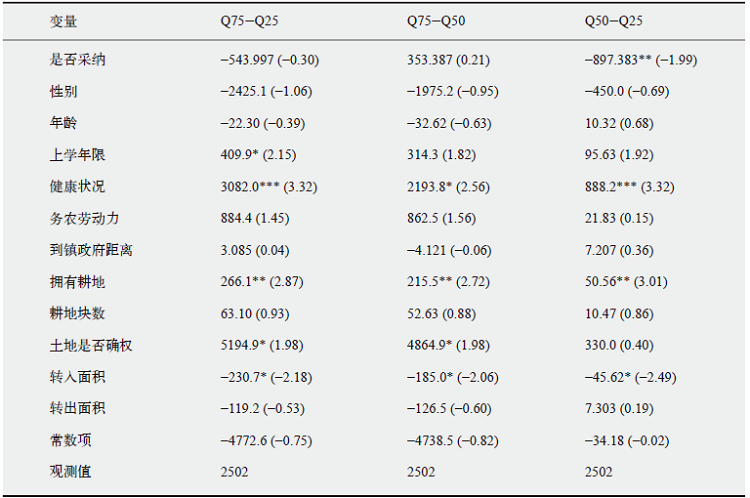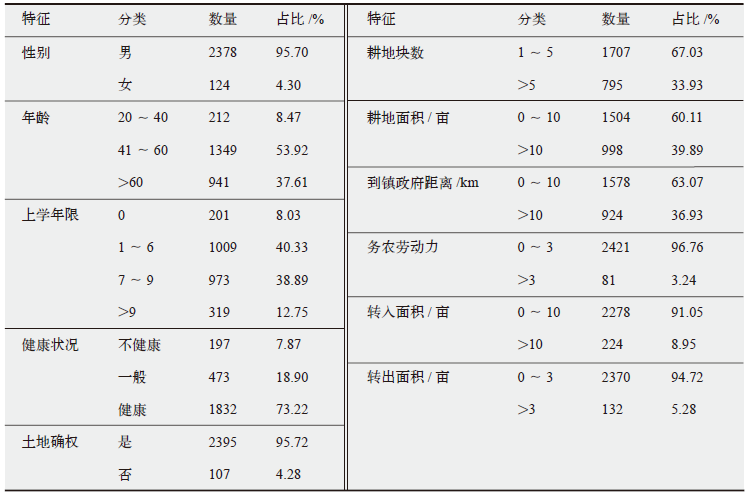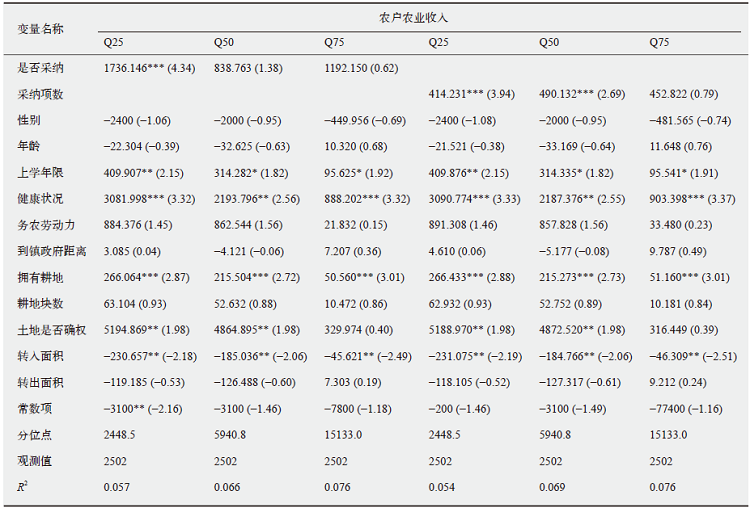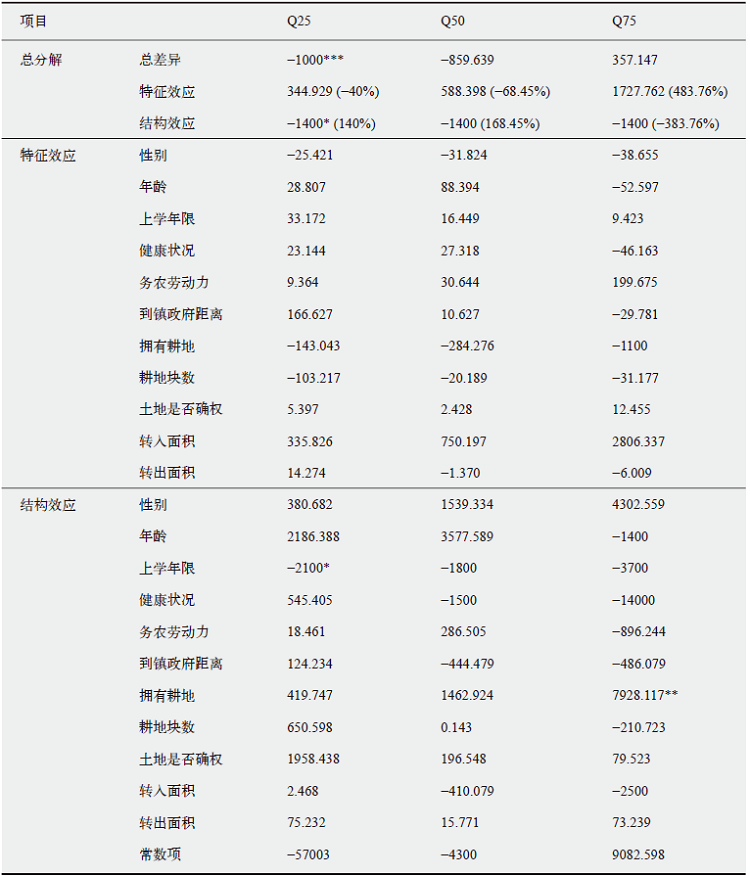Climate Change Research ›› 2024, Vol. 20 ›› Issue (2): 193-204.doi: 10.12006/j.issn.1673-1719.2023.186
• Adaptation to Climate Change • Previous Articles Next Articles
Impact of climate adaption technology adoption on farm households’ agricultural income
LI Xian-Kang( ), HAN Xing-Xing, LIANG Hong-Song(
), HAN Xing-Xing, LIANG Hong-Song( )
)
- College of Economics & Management, Northwest A & F University, Yangling 712100, China
-
Received:2023-08-28Revised:2023-12-03Online:2024-03-30Published:2024-01-22
Cite this article
LI Xian-Kang, HAN Xing-Xing, LIANG Hong-Song. Impact of climate adaption technology adoption on farm households’ agricultural income[J]. Climate Change Research, 2024, 20(2): 193-204.
share this article
Add to citation manager EndNote|Ris|BibTeX
URL: http://www.climatechange.cn/EN/10.12006/j.issn.1673-1719.2023.186
 |
Table 4 Results of the test of quantile differences in the gap of agricultural income per capita of farm households due to the climate adaptive technologies adoption
 |
| [1] | 陈帅, 徐晋涛, 张海鹏. 气候变化对中国粮食生产的影响: 基于县级面板数据的实证分析[J]. 中国农村经济, 2016 (5): 2-15. |
| Chen S, Xu J T, Zhang H P. Impact of climate change on China’s grain production: an empirical analysis based on county-level panel data[J]. China Rural Economy, 2016 (5): 2-15 (in Chinese) | |
| [2] | 苏芳, 刘钰, 汪三贵, 等. 气候变化对中国不同粮食产区粮食安全的影响[J]. 中国人口·资源与环境, 2022, 32 (8): 140-152. |
| Su F, Liu Y, Wang S G, et al. Impacts of climate change on food security in different grain-producing regions of China[J]. China Population, Resources and Environment, 2022, 32 (8): 140-152 (in Chinese) | |
| [3] | Arunrat N, Wang C, Pumijumnong N, et al. Farmers’ intention and decision to adapt to climate change: a case study in the Yom and Nan basins, Phichit province of Thailand[J]. Journal of Cleaner Production, 2017, 143 (FEB.1): 672-685 |
| [4] | Mase A S, Graming B, Prokopy L. Climate change beliefs, risk perceptions, and adaptation behavior among midwestern U.S. crop farmers[J]. Climate Risk Management, 2017, 15 (C): 8-17 |
| [5] | 吕亚荣, 陈淑芬. 农民对气候变化的认知及适应性行为分析[J]. 中国农村经济, 2010, 307 (7): 75-86. |
| Lv Y R, Chen S F. Analysis of farmers’ perception of climate change and adaptive behavior[J]. China Rural Economy, 2010, 307 (7): 75-86 (in Chinese) | |
| [6] | 冯晓龙, 刘明月, 仇焕广, 等. 资产专用性与专业农户气候变化适应性生产行为: 基于苹果种植户的微观证据[J]. 中国农村观察, 2018, 142 (4): 74-85. |
| Feng X L, Liu M Y, Qiu H G, et al. Asset specialization and professional farmers’ climate change adaptive production behavior: micro evidence based on apple growers[J]. China Rural Observation, 2018, 142 (4): 74-85 (in Chinese) | |
| [7] | 高雪, 李谷成, 尹朝静. 气候变化下的农户适应性行为及其对粮食单产的影响[J]. 中国农业大学学报, 2021, 26 (3): 240-248. |
| Gao X, Li G C, Yin C J. Adaptive behavior of farmers under climate change and its impact on grain yields[J]. Journal of China Agricultural University, 2021, 26 (3): 240-248 (in Chinese) | |
| [8] | 宋良媛, 杜富林. 气候变化适应性行为对牧户收入的影响研究: 以内蒙古为例[J]. 农业经济与管理, 2022, 73 (3): 86-96. |
| Song L Y, Du F L. A study on the impact of climate change adaptive behavior on the income of herding households: taking Inner Mongolia as an example[J]. Agricultural Economics and Management, 2022, 73 (3): 86-96 (in Chinese) | |
| [9] | Khonje M G, Manda J, Alene A, et al. Analysis of adoption and impacts of improved maize varieties in eastern Zambia[J]. World Development, 2015. DOI: 10.1016/j.worlddev.2014.09.008 |
| [10] | 杨宇, 王金霞, 侯玲玲, 等. 华北平原的极端干旱事件与农村贫困: 不同收入群体在适应措施采用及成效方面的差异[J]. 中国人口·资源与环境, 2018, 28 (1): 124-133. |
| Yang Y, Wang J X, Hou L L, et al. Extreme drought events and rural poverty in the North China Plain: differences in the adoption and effectiveness of adaptation measures across income groups[J]. China Population, Resources and Environment, 2018, 28 (1): 124-133 (in Chinese) | |
| [11] | 李锦, 洪霖. 青藏高原农户的气候变化适应与精准扶贫: 对松潘县青笋种植菜农的个案研究[J]. 青海民族大学学报(社会科学版), 2020, 46 (3): 1-7. |
| Li J, Hong L. Climate change adaptation and precision poverty alleviation among farmers on the Tibetan Plateau: a case study of green asparagus growing vegetable farmers in Songpan county[J]. Journal of Qinghai University for Nationalities (Social Science Edition), 2020, 46 (3): 1-7 (in Chinese) | |
| [12] |
Chen H, Wang J, Huang J. Policy support, social capital, and farmers’ adaptation to drought in China[J]. Global Environmental Change, 2014, 24: 193-202
doi: 10.1016/j.gloenvcha.2013.11.010 URL |
| [13] | 冯晓龙, 刘明月, 霍学喜, 等. 农户气候变化适应性决策对农业产出的影响效应: 以陕西苹果种植户为例[J]. 中国农村经济, 2017 (3): 31-45. |
| Feng X L, Liu M Y, Huo X X, et al. The effect of farmers’ climate change adaptation decisions on agricultural output: a case of apple growers in Shaanxi[J]. China Rural Economy, 2017 (3): 31-45 (in Chinese) | |
| [14] |
Abid M, Schneider U A, Scheffran J. Adaptation to climate change and its impacts on food productivity and crop income: perspectives of farmers in rural Pakistan[J]. Journal of Rural Studies, 2016, 47: 254-266
doi: 10.1016/j.jrurstud.2016.08.005 URL |
| [15] | Di Falco S, Veronesi M. How can African agriculture adapt to climate change? A counterfactual analysis from Ethiopia[J]. Social Science Electronic Publishing, 2012, 89 (4): 743-766 |
| [16] |
Finger R, Hediger W, Schmid S. Irrigation as adaptation strategy to climate change: a biophysical and economic appraisal for Swiss maize production[J]. Climatic Change, 2011, 105 (3-4): 509-528
doi: 10.1007/s10584-010-9931-5 URL |
| [17] | 陈欢, 周宏, 王全忠, 等. 农户感知与适应气候变化的有效性分析: 来自江苏省水稻种植户的调查研究[J]. 农林经济管理学报, 2014, 13 (5): 467-474. |
| Chen H, Zhou H, Wang Q Z, et al. Effectiveness analysis of farmers’ perception and adaptation to climate change: a survey study from rice farmers in Jiangsu province[J]. Journal of Agricultural and Forestry Economics and Management, 2014, 13 (5): 467-474 (in Chinese) | |
| [18] | 侯玲玲, 王金霞, 黄季焜. 不同收入水平的农民对极端干旱事件的感知及其对适应措施采用的影响: 基于全国9省农户大规模调查的实证分析[J]. 农业技术经济, 2016 (11): 24-33. |
| Hou L L, Wang J X, Huang J K. Farmers’ perceptions of extreme drought events at different income levels and their impacts on the adoption of adaptation measures: an empirical analysis based on a large-scale survey of farmers in nine provinces across China[J]. Agricultural Technology and Economy, 2016 (11): 24-33 (in Chinese) | |
| [19] |
唐利群, 周洁红, 于晓华. 采用保护性耕作对减少水稻产量损失的实证分析: 基于4省1080个稻农的调研数据[J]. 自然资源学报, 2017, 32 (6): 1016-1028.
doi: 10.11849/zrzyxb.20160635 |
| Tang L Q, Zhou J H, Yu X H. Empirical analysis of the adoption of conservation tillage on reducing rice yield loss: based on research data from 1080 rice farmers in four provinces[J]. Journal of Natural Resources, 2017, 32 (6): 1016-1028 (in Chinese) | |
| [20] | 常学向, 赵文智, 田全彦. 干旱区气候变化及其对山地森林生态系统稳定性和水文过程影响研究进展[J]. 干旱区地理, 2024, 47 (2): 228-236. |
| Chang X X, Zhao W Z, Tian Q Y. Progress of research on climate change in arid zones and its impacts on the stability of mountain forest ecosystems and hydrological processes[J]. Arid Zone Geography, 2024, 47 (2): 228-236 (in Chinese) | |
| [21] |
史鑫蕊, 韩百书, 王紫芊, 等. 基于APSIM模型模拟分析气候变化对不同熟性北方冬小麦生长和产量的影响[J]. 中国农业科学, 2023, 56 (19): 3772-3787.
doi: 10.3864/j.issn.0578-1752.2023.19.006 |
| Shi X R, Han B S, Wang Z Q, et al. Impact of climate change on growth and yield of northern winter wheat of different maturity based on APSIM model simulation[J]. Chinese Agricultural Science, 2023, 56 (19): 3772-3787 (in Chinese) | |
| [22] | 陶福禄, 熊伟, 许吟隆, 等. 气候变化情景下我国花生产量变化模拟[J]. 中国环境科学, 2000 (5): 8-11. |
| Tao F L, Xiong W, Xu Y L, et al. Simulation of peanut yield changes in China under climate change scenarios[J]. China Environmental Science, 2000 (5): 8-11 (in Chinese) | |
| [23] | 吴金栋, 王石立, 张建敏. 未来气候变化对中国东北地区水热条件影响的数值模拟研究[J]. 资源科学, 2000 (6): 36-42. |
| Wu J D, Wang S L, Zhang J M. Numerical simulation study on the impact of future climate change on hydrothermal conditions in Northeast China[J]. Resource Science, 2000 (6): 36-42 (in Chinese) | |
| [24] | 王兆来, 谷黄河, 王晓燕, 等. 拉萨河流域水沙过程模拟及对植被覆盖和气候变化的响应[J]. 水文, 2023, 43 (6): 91-96. |
| Wang Z L, Gu H H, Wang X Y, et al. Simulation of water-sediment processes and response to vegetation cover and climate change in the Lhasa River basin[J]. Hydrology, 2023, 43 (6): 91-96 (in Chinese) | |
| [25] | 童庆蒙, 张露, 张俊飚. 家庭禀赋特征对农户气候变化适应性行为的影响研究[J]. 软科学, 2018, 32 (1): 136-139. |
| Tong Q M, Zhang L, Zhang J B. Research on the impact of family endowment characteristics on farmers’ climate change adaptive behavior[J]. Soft Science, 2018, 32 (1): 136-139 (in Chinese) | |
| [26] | 冯晓龙, 陈宗兴, 霍学喜. 干旱条件下农户适应性行为实证研究: 来自1079个苹果种植户的调查数据[J]. 干旱区资源与环境, 2016, 30 (3): 43-49. |
| Feng X L, Chen Z X, Huo X X. Empirical study of farmers’ adaptive behavior under drought conditions: survey data from 1079 apple farmers[J]. Arid Zone Resources and Environment, 2016, 30 (3): 43-49 (in Chinese) | |
| [27] | 吴春雅, 刘菲菲. 气候变化背景下稻农洪涝适应性工程措施采用行为研究: 基于鄱阳湖生态经济区调查[J]. 农业技术经济, 2015, 239 (3): 15-24. |
| Wu C Y, Liu F F. Research on the adoption behavior of flood adaptation engineering measures for rice farmers under the background of climate change: based on the survey of Poyang Lake ecological and economic zone[J]. Agricultural Technology and Economy, 2015, 239 (3): 15-24 (in Chinese) | |
| [28] | 童庆蒙, 张露, 张俊飚. 基于湖北省十个代表县(市)的农户适应气候变化的偏向特征与影响因素分析[J]. 中国农业大学学报, 2019, 24 (1): 194-205. |
| Tong Q M, Zhang L, Zhang J B. Analysis of bias characteristics and influencing factors of farmers’ adaptation to climate change based on ten representative counties (cities) in Hubei province[J]. Journal of China Agricultural University, 2019, 24 (1): 194-205 (in Chinese) | |
| [29] | 刘海英, 王殿武, 谢建政. 粮食增产与农民增收一致性关系研究[J]. 云南社会科学, 2018, 226 (6): 80-85, 188. |
| Liu H Y, Wang D W, Xie J Z. Research on the coherent relationship between grain production increase and farmers’ income increase[J]. Yunnan Social Science, 2018, 226 (6): 80-85, 188 (in Chinese) | |
| [30] |
徐玉婷, 黄贤金, 陈志刚, 等. 农地转入规模扩大有助于农民农业增收吗?基于中国中部5省农户调查的实证研究[J]. 自然资源学报, 2016, 31 (10): 1624-1636.
doi: 10.11849/zrzyxb.20151314 |
| Xu Y T, Huang X J, Chen Z G, et al. Does the expansion of the scale of farmland transfer help farmers to increase their agricultural income? An empirical study based on a farm household survey in five provinces in Central China[J]. Journal of Natural Resources, 2016, 31 (10): 1624-1636 (in Chinese) | |
| [31] | 盖庆恩, 李承政, 张无坷, 等. 从小农户经营到规模经营: 土地流转与农业生产效率[J]. 经济研究, 2023, 58 (5): 135-152. |
|
Gai Q E, Li C Z, Zhang W K, et al. From small-farm operation to large-scale operation: land transfer and agricultural production efficiency[J]. Economic Research, 2023, 58 (5): 135-152 (in Chinese)
doi: 10.1016/j.rie.2004.02.003 URL |
|
| [32] | 富丽莎, 汪三贵, 秦涛. 农业保险的增收效应及其作用机制[J]. 中国人口·资源与环境, 2022, 32 (12): 153-165. |
| Fu L S, Wang S G, Qin T. Income-generating effect of agricultural insurance and its mechanism[J]. China Population, Resources and Environment, 2022, 32 (12): 153-165 (in Chinese) | |
| [33] | 杨丹, 曾巧. 农户创业加剧了农户收入不平等吗: 基于RIF回归分解的视角[J]. 农业技术经济, 2021 (5): 18-34. |
| Yang D, Zeng Q. Does farm household entrepreneurship exacerbate farm household income inequality: a perspective based on RIF regression decomposition[J]. Agricultural Technology and Economics, 2021 (5): 18-34 (in Chinese) | |
| [34] | 孙治一, 孙大鹏, 于滨铜, 等. 兼业如何影响农户“一家两制”生产行为?来自全国5省1458个农户样本的经验证据[J]. 中国农村经济, 2021 (6): 44-59. |
| Sun Z Y, Sun D P, Yu B T, et al. How does part-time employment affect the production behavior of “two systems in one household”? Empirical evidence from a sample of 1458 farm households in five provinces of China[J]. China Rural Economy, 2021 (6): 44-59 (in Chinese) | |
| [35] |
Nikolaou K. Regression quantiles I[J]. Econometrica, 1978, 46 (1): 33-50
doi: 10.2307/1913643 URL |
| [36] | Firpo S, Fortin N M, Lemieus T. Unconditional quantile regression[J]. Econometrica, 2009 (77): 953-973 |
| [37] | 程名望, 史清华, Jin Y H M, 等. 农户收入差距及其根源: 模型与实证[J]. 管理世界, 2015 (7): 17-28. |
| Cheng M W, Shi Q H, Jin Y H, et al. Farm household income gap and its root causes: modeling and empirical evidence[J]. Management World, 2015 (7): 17-28 (in Chinese) |
| No related articles found! |
| Viewed | ||||||
|
Full text |
|
|||||
|
Abstract |
|
|||||





